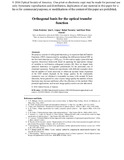Orthogonal basis for the optical transfer function
Fecha
2016Versión
Acceso abierto / Sarbide irekia
Tipo
Artículo / Artikulua
Versión
Versión aceptada / Onetsi den bertsioa
Impacto
|
|
10.1364/AO.55.009688
Resumen
We propose systems of orthogonal functions qn to represent optical transfer functions (OTF) characterized by including the diffraction-limited OTF as the first basis function q0 OTF perfect. To this end, we apply a powerful and rigorous theoretical framework based on applying the appropriate change of variables to well-known orthogonal systems. Here we depart from Legendre polynomials for the par ...
[++]
We propose systems of orthogonal functions qn to represent optical transfer functions (OTF) characterized by including the diffraction-limited OTF as the first basis function q0 OTF perfect. To this end, we apply a powerful and rigorous theoretical framework based on applying the appropriate change of variables to well-known orthogonal systems. Here we depart from Legendre polynomials for the particular case of rotationally symmetric OTF and from spherical harmonics for the general case. Numerical experiments with different examples show that the number of terms necessary to obtain an accurate linear expansion of the OTF mainly depends on the image quality. In the rotationally symmetric case we obtained a reasonable accuracy with approximately 10 basis functions, but in general, for cases of poor image quality, the number of basis functions may increase and hence affect the efficiency of the method. Other potential applications, such as new image quality metrics are also discussed. [--]
Materias
Optical transfer functions,
Numerical approximation and analysis,
Metrics,
Testing
Editor
Optical Society of America
Publicado en
Applied Optics, 2016, 55(34), 9688-9694
Departamento
Universidad Pública de Navarra. Departamento de Ingeniería Matemática e Informática /
Nafarroako Unibertsitate Publikoa. Matematika eta Informatika Ingeniaritza Saila
Versión del editor
Entidades Financiadoras
This research was supported by the Spanish Ministry of Economía y Competitividad and the European Union MTM2014-52859 and FIS2014-58303.






